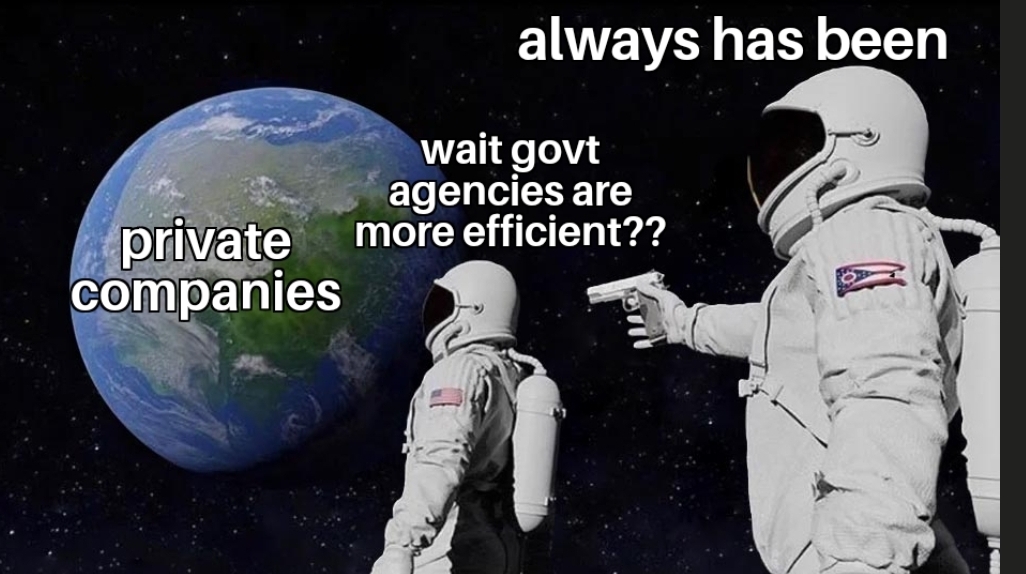
Australia is a live example of the fact that they’re not. The state and federal governments have privatised a crap load of services and all they do is continue to hike our bills while providing less and less service. Electricity, water supply, employment services and more are now an absolute joke here.
Yep because what’s more important than efficient, cost effective services? Spoiler, it’s profit.
Profit for their mates and fellow shareholders, not profit for the country either.
deleted by creator
Exactly what’s about to happen to employment services in Australia too. They spend more money chasing a hand full of people who don’t want to work than just continuing to pay them the pittance they exist on and have people apply to be the CEO of huge corporations who dropped out of high school in order to make their quotas. Government just announced an inquiry with the aim to reinstate control over it.
deleted by creator
Yes, if not for when the Labor (sic) party got into power that one time, we’d all still be stuck on ADSL2 at best, and dialup at worst, depending on how close you live to a major-ish city. The NBN was a government infrastructure initiative. One which got gutted and watered down as soon as the Liberals got back in.
Oh, and I’ve heard industry insiders claim that the mixed technology stack employed in the “new NBN” – FTTP for some places that already got it, FTTN for everywhere else in the city, fixed wireless or satellite for rural areas – is more expensive on an ongoing basis due to complications than just rolling out more fibre would have been in the long run.
Not to mention the state of ISPs in Australia. I believe you pay more for less than almost every country. Two exceptions being the US and Canada.
My mom mockingly said once “do you want your doctor visits to be just like the DMV?”
Nope, I want my doctor visits to be more like the USPS. Compare their numbers to UPS or any of the others and it’s night and day.
My mom mockingly said once “do you want your doctor visits to be just like the DMV?”
My answer would be “yes, because that’d be an improvement!”
Having worked for both, I would say that most government offices are eternal, whereas private companies can vanish quickly. Sometimes without warning. Its really hard to kill a government office.
Makes me wonder, how did a necessary office survive during a junta or an overthrow? For example, how did the office of a postal clerk change from 1925 to 1955 in, say, Berlin? How does the average Salvadoran DMV worker view the changes in El Salvador since 1980?
How was a tax office run in ancient Babylon versus a modern one today?
I bet there’s some weird insights into human civilization to be found in those stories.
My understanding is that the more removed you are from the “top” of the government pyramid, the less you are affected by disruptions of that position. Largely when a new face or party takes over (by force or otherwise) very seldom do they want to rebuild everything from the ground up and will keep most of the bipartisan offices untouched.
If a very violent coup is successful and they’re planning punishments for all “government officials” the postman in a rural village is going to be pretty low on that list.
Only someone who has never worked for a large corporation could hold the belief that corporations are efficient at making their product.
They’re very efficient at funneling money to their executives and owners though.
Only someone who has never worked for the government could hold the belief that they are more efficient at doing anything at all at any time.
I’ve worked for the government both as an employee and a contractor. I’ve also worked for small and large companies. The government was by far better at accomplishing the actual objective / product. The worst government entity I worked for though was a city government. Those are terrible.
I remember in college we took a course on economic efficiency and the short takeaway is “the free market is extremely efficient, but only when the competing parties start with equal resources. the more inequal the starting position, the less efficient the market becomes.” and to my mind that suggests that we should enforce some sort of “rubber-banding” effect so that a company needs to keep competing or else it will “drift” back to the mean over time. Something like aggressive taxes on the uber-rich and comprehensive welfare for the poor, y’know? Capitalism but with safety guards would be pretty cool.
Something like aggressive taxes on the uber-rich and comprehensive welfare for the poor, y’know?
This is why aggressive estate taxes are so incredibly critical. People shouldn’t be professional descendants. And of course welfare provides both ladder and safety net. The fools who are trying to abolish one or both are working against social mobility.
Because they think social mobility is wrong and bad for society
There is a reason why the European/Scandinavian economic model works so well.
I think just don’t allow other companies to buy others. Mergers should be illegal.
Afraid to say this but that college course was capitalist propaganda. When you look at the actual facts it points to capitalism being trash in every metric except cancer-like growth for the sake of cancer-like growth, which of course it’s good at because that’s what it was designed for.
I think a big issue is that the government takes a decades long view. This is great because they can plan how to effectively manage our water and other large scale projects with longevity in mind.
Meanwhile, our corporate CEOs take a quarter of a year view. They’d burn the company to the ground as long as it happens after they are stepping down and makes them look good beforehand.
the government takes a decades long view
You mean four year term view? They dont give a shit about what happens next. If they did they would do something against climate change
Ah I wasn’t clear. I don’t mean government as in Democrats or Republicans. I mean government associations like US Army Corps of Engineers or the US Postal Service.
Maybe we should start a US Army Climate Battalion or something to sound cool and get funding 🤔.
Private companies are why Flint still has lead water pipes, and why Texas doesn’t have a working power grid, and why you and I are facing a 30%-50% increase in our cost of living.
There needs to be MORE regulation. Not less.
Ignorant AF.
They are better at maximizing profits at the expense of the employees, benefits, wages, local taxes and infrastructure. They work for the shareholders. They shovel money to the top few percent of the company. That’s what we call “efficiency”.
The government does not profit. They government pays standard government wages along with union wages and benefits. They maintain infrastructure. They are only as efficient as contracts allow.
Corporations do not have the same goals as government. One seeks to extract maximum profits for the few at the expense of the many, the other seeks to return to the many as much as is feasible in societal good - schools, roads, power, water, etc. at no profit.
Well said.
It’s hard to believe that anyone with the mental capacity to lift a spoon to their mouth would vote for the right (who are solely responsible for mass privatisation in Australia anyway, im assuming it’s the same elsewhere).
Getting people to cuck to corporations was the entire point of the 1996 Telecommunications Act
When listing what they sacrifice to maximize profit you forgot to mention service quality and customer satisfaction.
Just enough service to keep you from leaving, because you know the nearest competitor will treat you just as badly.
Corporations do not have the same goals as government. One seeks to extract maximum profits for the few at the expense of the many, the other seeks to return to the many as much as is feasible in societal good - schools, roads, power, water, etc. at no profit.
That’s a complete perversion of what corporations were supposed to be for, by the way.
Efficient at what, making profit for themselves?
Why is profit an only measure for efficiency?
In this case it’s the definition of efficiency. Efficiency = (resources used up) compared to (resources taken in). How else would you even calculate it?
Yes the actual work that is getting done by the company or government is important too. Private companies generally do better at efficiency of getting work done (products or services being produced) than government. This is because government agencies are burdened with an unimaginable amount of levels of bureaucracy which kills the shit out of any efficiency. The government is the ultimate bureaucracy.
Anyone who has worked for both the government and private sector can tell you all about this. When I worked for the government it was the most boring job ever and there was so little actual work getting done that I would sit around reading a book on the job, waiting for something to do. At every non-govt job I’ve had that would not fly because the employer would see the dollars vanishing for my paid-to-do-nothing hours and put me to work doing something productive.
Possibly, but they have different incentives.
Depends on the situation I’d say.

I’m a private sector worker slacking off and shitposting on reddit/lemmy all day…
We are DEFINITELY NOT more efficient than the public sector
If I had my way I’d make as many services public as possible. I cant stand tge fact that I pay taxes and the “public” transportation (train/bus/subway) isn’t free. Imagine how much pocket change you would have if energy companies, telecoms (cell/wifi), and transportation were all gov-run? All that said I have no idea how that would translate in practice, its a nice little daydream I had.
I always thought my city’s bus system would be more efficient if they didn’t have to bother with charging everyone $1.50 for a ticket when they board.
In fact, they did have free fare this summer in an effort to improve the air quality. Ridership was much higher, and the driver didn’t have to mess with the finicky cash machine at every stop.
Most of the people who take the bus here are poor and/or disabled, anyway. I’d love it if they could do away with fares, but I know they’re doing the best they can with their limited funding.
My bus ride to work shortened by 10 minutes after getting rid of fares. It mostly serviced a poorer area of town to the downtown hub. Notable stops are a grocery store and the public library where 10-15 people swaps would occur.
Fare free is a great move towards equity too.
Man I wish I had better public transit where I live. Gotta drive cars everywhere, seeing a bus is like seeing a unicorn.












